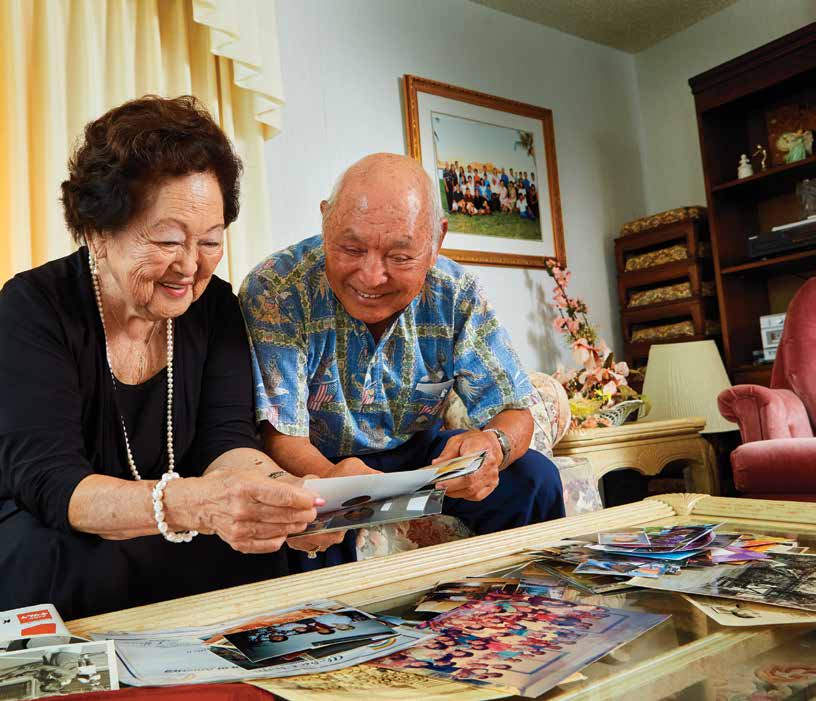
Family is a very important source of virtues and values. Our ancestors collected generational wisdom from their ancestors — surviving and thriving through famines, wars, migrations, dynasties and empires. Closely knit families can be a source of nurturing, support and protection for their members; family and cultural traditions support us through important life passages, and provide the framework for how we respond to challenges and opportunities.
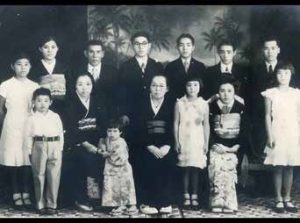
Like many Hawai‘i residents, husband and wife Les and Shirley Ihara of Kāne‘ohe came from Japanese immigrant families. Their families were able to manage through the Great Depression and provide them an education. After World War II, they began their own family, and Les’ Army career took them all over the United States and abroad. Now in their late 80s, they find themselves the patriarch and matriarch of a four-generation clan that practices togetherness. There are lessons for all of us in the Iharas’ simple recipe for a happy life: be patient, be tolerant, do what brings happiness and have fun wherever you are.
They graciously agreed to share their stories, and the values they learned from their parents that they felt were important to pass on. There are some lessons here for all of us.
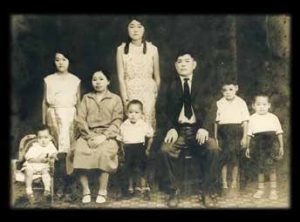
The Roots of Family Culture
Shirley Sonoda was born in Kahului, Maui, the youngest of six children. She grew up in an Hawaiian Commercial & Sugar Company (HC&S) plantation home in McGerrow Camp, Pu‘unēnē. Hard work was honorable and led families to success. Shirley’s father worked in husbandry at Waihe‘e,Pu‘unēnē and Haleakala Dairies, taking care of birthing cows and calves. Her mom worked in the dairy’s plant, washing the pint-sized glass milk bottles that were used at the time. Shirley describes a “wonderful,” childhood in an agricultural community surrounded by fresh fruits and vegetables and lots to do. “As the youngest, I was spoiled,” she said.
Family Support and Encouragement
Shirley favors her pretty mother. Shirley giggles. “My name is really Mitsue, but one day a lady said, ‘that child looks just like Shirley Temple,’ and from then on, I was always called Shirley. My oldest sister, Hilda, doted on me, and my brother, Kiyoshi, who was one up from me, was my protector and best friend,” said Shirley. She had a lot of boyfriends, but was encouraged to focus on her studies and go to college. During the summers before her junior and senior years at Baldwin High School, Shirley worked on the line at the Maui Pineapple Company cannery in Kahului.
Shirley’s parents both came from Kumamoto on the island of Kyushu in the southern part of Japan. Her father immigrated to Maui first. Wars with China were very hard on the Japanese people and Shirley’s maternal grandparents wanted her mom to have a better life, so they allowed her to become a “picture bride.”
Les is also Nisei (a first-generation American of Japanese descent) and ninth of 11 children. “I had a lot of attention and supervision from the older siblings, but we were all very supportive of one another,” said Les. “I think it is important to allow the kids to pursue what they really want to do and give them the encouragement they need.”
“I wanted the kids to be scouts like me, but they much preferred sports and didn’t continue in scouting,” said Les. “So, I supported them in sports and they all became good athletes — and our grandchildren are, too. Percy was bigger than the other boys and excelled in baseball. My daughter, Sherry, and her daughters, Cynthia and Cathlene, coach tennis for St Andrew’s Priory and Sacred Hearts Academy. All our kids are good swimmers and the grandchildren are into many different team sports. In Japanese, we encourage one another with this expression: gaman. It means to stick with it or hang in there. So I tell our grandchildren to pick what feels comfortable for you — what you like to do — and then do your best to stick with it.”
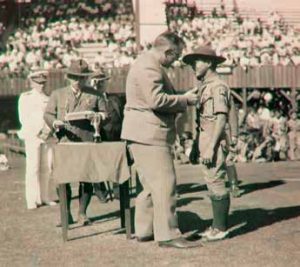
Family History of Enterprise
About 10 years ago, Les discovered some interesting background about his father’s family. In 1898, his father and paternal uncle came to Hilo from Yamaguchi-ken on the main island of Honshu. His dad came to build railroad bridges and tunnels for the cane trains between Hilo and Honoka‘a. His uncle was a labor negotiator, procuring contracted workers from Japan. The brothers’ last name was Tomishima.
It was the turn of the century and the end of the first Sino-Japanese War when China signed the treaty of Simonoseki, and ceded both Taiwan and Penghu to Japan. In the occupation, Japan sent educators to teach the Japanese language and culture to the people on these islands. On Jan. 1, 1900, the Taiwanese resistance killed eight Japanese educators; one of whom was the only son of the Ihara family. “Without an heir, the family decided to adopt my father,” said Les.
Les’ maternal grandmother was a merchant who came to Hawai‘i in the 1930s and ran the Shigeta Store in Hilo, which later became the Ihara Store. This general merchandise store was famous for penny “ice cakes,” a type of Popsicle. Strawberry was the most popular flavor, but Les loved the azuki bean ice cake. When Les got his driver’s license at age 15, he became the store’s delivery person, hauling groceries and charcoal to customers’ homes. Right across the store on Kīlauea Avenue was the Hilo Hongwanji Mission.
Formative Training
“Church and language school at the hongwanji were very important to my parents and to me,” said Les. “I learned Japanese language, martial arts and discipline. I also became very interested in scouting and achieved Eagle Scout before my last year of high school.” Les even considered a career in scouting administration, but social workers were in demand after the end of WWII, so he studied psychology and social work at University of Hawai‘i at Mānoa. “Scouts’ honor and honesty have always ruled my life and I tried to pass on these virtues,” he said.
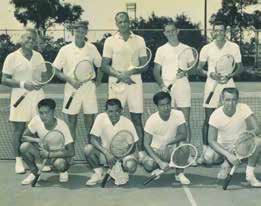 Les also loved tennis. “In high school, I would collect stray tennis balls from around the court and when I found old racquets in the rubbish bins, I would repair them — that’s how I started playing tennis.” He taught himself by reading tennis books and putting conceptual techniques into practice. Discipline learned at Hongwanji paid off and Les won the Hawai‘i Island championship in 1945.
Les also loved tennis. “In high school, I would collect stray tennis balls from around the court and when I found old racquets in the rubbish bins, I would repair them — that’s how I started playing tennis.” He taught himself by reading tennis books and putting conceptual techniques into practice. Discipline learned at Hongwanji paid off and Les won the Hawai‘i Island championship in 1945.
Later, he would join the All Army Tennis Team in the ’60s and win the Armed Forces Senior Singles and Doubles Championship in 1980, in addition to numerous others trophies. He still plays three days a week and says tennis keeps him healthy, mentally and physically. He aims to play as long as he can.
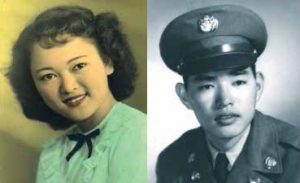
Respect for Education
All Japanese-Americans share a deep respect for education. The Issei (Japanese immigrants) assimilated American culture but insisted that their children attend both public school and also Japanese school. Les and Shirley were also encouraged by their families to pursue higher degrees — older siblings paid tuition for the younger ones. They sent their boys to Mid-Pacific Institute for high school and paid college tuition for all six kids. This high value placed on education has been extended to the grandchildren, too. The tradition created four independent business owners, one professional educator and one state Senator.
Love and Marriage
At the same time Les was at UH, Shirley was attending business college in Honolulu and living in a beach hut where the Hilton Hawaiian Village now stands. She was studying hard, babysitting part-time at Queen’s Surf Hotel and doing bookkeeping for the Niumalu Hotel Restaurant. Handsome Les Ihara happened to be bussing tables at Niumalu and fell for beautiful, upbeat Shirley.
“She agreed to go to a dance with me — that was great,” reminisced Les. “Shirley is all the things I am not. She is outgoing, thrifty and laughs a lot. I am very appreciative and still love to be around her. My goal is to spoil her and make her happy.”
They could hardly wait to be married, but Les’ family would not allow it until he graduated and had a job. He received his degree on June 14, 1950, and landed a job in Hilo as a social worker a few months later. On Shirley’s birthday, they were married in the Niumalu Hotel garden on the afternoon of Sept. 4, 1950. That night, Les and Shirley flew to Hilo and the next day, Les began his first job.
The Korean War started a week after Les graduated from college. Les got a few months deferment, but in early 1951, he was drafted and took basic training at Schofield Barracks on O‘ahu and later at Fort Ord, California. After basic training, he had a choice to finish advanced basic training and go to Korea as an infantryman, or to enroll in Officer Candidate School (OCS). Of course, he chose OCS at Fort Bliss in El Paso, Texas. Shirley, who was carrying their first child, stayed with her oldest sister on O‘ahu and joined him later.
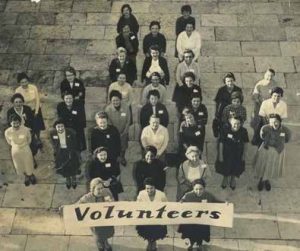
Be Patient; Be Tolerant
Les was commissioned a second lieutenant in May 1952 and was assigned to Camp Roberts near San Miguel, California, where an all-Caucasian National Guard outfit from Alabama was in active duty training for the Korean War. He was the only non-white officer in the entire battalion but he said he didn’t feel any discrimination. In late 1953, the Army was ordered to integrate. Les was then a platoon leader and when black soldiers joined the unit, he experienced, firsthand, the effects of discrimination. At that time, soldiers carried half a field tent in their backpacks. At night, two men piched their tents together. “I could not believe that all those guys were trying to bed down
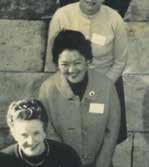 in half-tents. I ordered them to put the tents together, but the order was never carried out and I knew my superiors would never back me up.” Nevertheless, Les stood by his values of tolerance and kindness. “One time in college, a gang of tough guys sucker punched me. I got away, ran to the Coke machine and broke an empty bottle to make a weapon to defend myself. They decided not to beat me up, and I will never forget that feeling of being outnumbered. I teach my kids to be tolerant and kind to everyone.”
in half-tents. I ordered them to put the tents together, but the order was never carried out and I knew my superiors would never back me up.” Nevertheless, Les stood by his values of tolerance and kindness. “One time in college, a gang of tough guys sucker punched me. I got away, ran to the Coke machine and broke an empty bottle to make a weapon to defend myself. They decided not to beat me up, and I will never forget that feeling of being outnumbered. I teach my kids to be tolerant and kind to everyone.”
Look at Change as Adventure
Career Army families get bounced around among duty assignments. The term “Army brat” comes from Army children who were traumatized by moving around from place to place. Psychologists found that the parents’ attitude about change determined if the children were hurt by the moves or grew up well-adjusted. This is where Shirley’s “Pollyanna” view of life, seeing the good in people, places and events, was a distinct advantage. Instead of saying, “Oh no!— not another move,” Shirley would respond, “Korea? Great! I want to see the world!” Her children learned to love adventure and look for fun in new undertakings.

In following years, the growing Ihara family moved wherever the Army needed Les: Hawai‘i, Germany, Kansas, Virginia, California and Korea. Shirley recalled, “I was one of the wives who moved and followed my husband to most of his duty stations. The only place I did not go was Vietnam. For me, it was exciting to see new places and meet new people. When the kids were small, it was no problem moving them from one school to another. Every new place was an adventure. In Germany, Percy was born and he stayed with a nanny while we took the older children on trips to the Benelux countries and Switzerland. Sometimes we would leave all the children at home and get away for a weekend by ourselves. It was a great life.”
Percy recalls long cross-country trips to Virginia in the family’s Country Squire Station Wagon. The children passed the long hours playing cards — Paiute (Hawaiian Knock Poker) was a favorite. “After my dad clocked 500 miles, we began looking for a motel with vacancies, a pool and a kitchenette. After checking out a few, we would all vote on where to stay. In those days, if a motel had a color TV, it might win our vote.” Family democracy is a way of teaching children the power of the vote, how to debate your point of view, and how to accept the group’s authority, if you don’t win. This is a powerful form of mutual support.
Shirley’s zest for life resonates in younger generations of Iharas. They all love to travel. Annual family vacations bring 30 to 40 members of the Ihara clan together, and Les and Shirley pay for everything. “We would not be able to afford the vacations for our family if they didn’t take us to Canada, Washington and almost every Hawaiian Island over the past 20 years,” said oldest daughter Sherry. This love for the unknown and ability to find fun in new situations plays out in many ways. One is managing risk and return, the hallmark of entrepreneurs. Converting adversity into blessing has become an Ihara family “trait.”
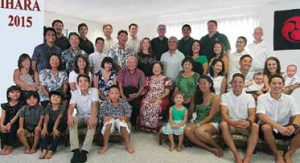
Social Responsibility
Being the spouse of a commissioned officer living on an Army base challenged Shirley with new family and social responsibilities. She learned to be an extraordinary hostess. On the spur of the moment, she needed to be prepared to graciously accompany Les to formal functions at the officers’ club. She said with a smile that a nice set of pearls “will turn any dress into proper dinner attire — I learned that from other Army wives.” She also fondly remembers a major’s wife who taught her to play bridge. “That was nearly 60 years ago. She invited me to join other ladies for lunch and bridge.” She added, “They said I was a fun person and I certainly enjoyed the game. Les and I still play once a week.”
Helping one another translates to community, too. Before Les retired as a colonel, he helped a lot of younger soldiers learn the ropes of military command. Shirley volunteered extensively with the American Red Cross. These expressions of altruism were not lost on their children — they and their families are civil servants, volunteers, educators and community business people. All Ihara family members devote themselves to community service by volunteering for nonprofits, churches and community athletics. Now their grandchildren volunteer, too.
Enjoy Life With Your Family — Stay Connected
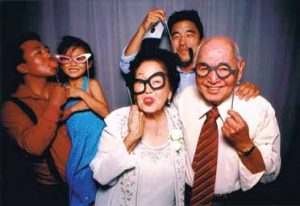
Shirley is definitely fun to be around. “Les has learned to be a good laugher,” she said. “It is so easy to become grumpy; it’s very important to laugh every single day and enjoy life.”
I think the Iharas mastered something that some families might take for granted. It is mutual respect and support. Family members stay connected even though they are busy, because you can’t really be supportive if you don’t know what challenges your family is facing. Once a month, Shirley and Les and all the four generations get together for a meal. There’s opportunity for real connection when they go on an extended vacation together.
Les and Shirley have a life of their own, too — Las Vegas every other month and a cruise once a year. Shirley is thankful that she could focus on her family because she never had to take a job. She also quips that she is not ready to “retire” from her family responsibilities: cooking fabulous meals and keeping track of all 14 grandchildren.
In the close and supportive Ihara family, these are the values that Shirley and Les learned from their parents and grandparents: be honest, work hard, go after what you want and stick with it. They maintain family togetherness by committing themselves to enjoying life by keeping a tolerant and upbeat attitude, by supporting other family members in what they want to do and by spending time helping others in their community.
In November, Les and Shirley were doting on a new Ihara great-grandchild in Washington State. Their six children are passing down Ihara family traditions to 14 grandchildren and a fourth generation of nine great-grandchildren. These are wonderful lessons for all families, and to Les and Shirley we say, “Thank you.” To us they say, “Gaman!”


Leave a Reply